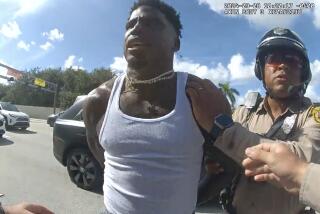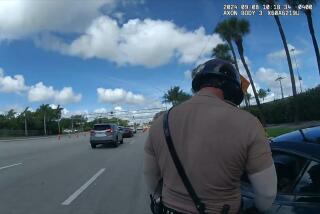Defense Passes in Copter Tampering : Hearing Officer to Rule on Court-Martial for Marine
- Share via
Government prosecutors Wednesday called Marine Corps helicopter crew chief Cpl. Kirk Hill a “bitter” man who created a “potentially dangerous situation,” while his defense depicted the Marine as another casualty in the war between the enlisted ranks and their officers.
Government attorney Capt. Bradley N. Garber and Kevin McDermott, a Santa Ana lawyer representing Hill, made closing arguments at a hearing into the validity of charges against the Hill, 24, who is stationed at the Tustin Marine Corps Air Station.
Charges against Hill included dereliction of duty, intentionally trying to damage a military helicopter, attempting to destroy the national defense and hazarding a vessel, an old military law that could be a capital offense.
Additional charges against Hill--marijuana use, disobeying orders and tampering with a drug analysis--were made public Tuesday.
A drug abuse officer testified Wednesday that Hill had tried to substitute another urine sample during a squadron “drug sweep” on Dec. 22.
Lt. Charles Benson of the Marine Heavy Helicopter Squadron said he noticed a “bulge” in Hill’s utility pants after he gave a urine sample and found another sample bottle in his trousers.
The lieutenant said that Hill was ordered to produce another urine sample and that the second sample tested positive for marijuana.
The hearing ended Wednesday after two days of testimony from government witnesses. No witnesses were called by the defense. Hill did not testify.
Hearing officer Capt. Thomas Scully said he would make a recommendation in about a week to Hill’s commanding officer on whether to go ahead with a court-martial, to settle the matter administratively or to drop charges against Hill. The final decision will be made by Lt. Col. J. S. Cipparone, commanding officer of Heavy Helicopter Squadron 361.
“For some unknown reason, he did this,” Garber said, adding that Hill’s actions could not be taken lightly because they “could cause a catastrophic situation.”
Garber said the tampering could have meant forcing the pilots to “wrestle the aircraft” to the ground in a “potentially dangerous situation.”
“In some way he was kind of bitter toward Capt. Petit and Capt. McMenomy,” Garber said referring to helicopter pilot Bruce Petit and co-pilot Chris McMenomy, who were flying the aircraft the night the wires were switched.
Hill, according to testimony Tuesday, freely admitted to other Marines that he had “cross-connected” wires leading from the Ch-53D Sea Stallion’s automatic flight control system to make a point that pilots were flying unsafe helicopters.
Testimony from pilots and maintenance specialists was inconclusive about the seriousness of what Hill had done. Some said the tampering endangered the aircraft, while others, including the pilots, were confident that the helicopter was airworthy, even though the plugs were switched.
McDermott, in his closing arguments, reminded the government that even if Hill’s “cross-connection” is determined to be a serious act, there was no physical evidence to prove that Hill had switched the wires.
“An admission is not evidence enough to convict,” McDermott said. “There is no smoking gun or cold body.”
Besides, McDermott said, the helicopter was never taken out of service, so there was no “destruction of nation defense,” and if safety is an issue, prosecutors would have to remember that Hill flew on the helicopter after the wires were switched.
“He boarded and flew that night,” McDermott said. “The pilots said it was safe.”
“The long and the short of it was that two pilots were embarrassed by an enlisted man who questioned the safety of an aircraft,” McDermott said, adding that rather than “reprimanding” the officers for making a mistake by flying anyway, the Marine command elected to “go after an enlisted man.”
McDermott then questioned who should be on trial, Hill or the pilots.
McDermott, who served as a Marine officer at El Toro, said in an interview that the Hill case may be a typical confrontation between an enlisted man and commissioned officers. “We know who usually wins,” he said.
More to Read
Sign up for Essential California
The most important California stories and recommendations in your inbox every morning.
You may occasionally receive promotional content from the Los Angeles Times.













